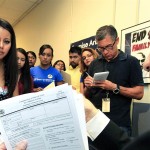Newsweek Notes ‘Civil Gideon’ In Eviction Issue
Immigration Backlog Shows Need For More Lawyers

This photo was part of an NBC News report, “Demand Intensifies for Nonprofit Immigration Lawyers” discussing how the US immigration system is seriously lacking in how it represents the poor.
NBC News is among those taking a look back at 2014 and finding the country’s immigration system seriously lacking in how it represents the poor. Says NBC, “… the past summer’s flocking of children and families to the U.S.-Mexico border, the president’s impending executive action on immigration and the two-year-old Deferred Action for Childhood Arrivals, DACA, have intensified demand for immigration attorneys, particularly those who charge little to nothing. With each success, they amplify the difference good legal help can make in the lives of immigrants.”
Another Young Voice For Civil Gideon In Minnesota
She makes a strong case. Read more here.
NYT Boards The ‘Civil Gideon’ Train, Sort Of
A lawyer makes the case for Civil Gideon
A big part of the border crisis involving unaccompanied minors from Central America is legal representation. If the refugees have legal representation, they tend to remain in the United States. Without legal representation, most are sent back. But if they should have representation in what remains a civil action, who else should?
A lawyer makes the case for a “civil Gideon” on page 3 in our print edition. Read it here!